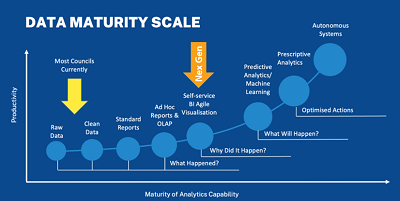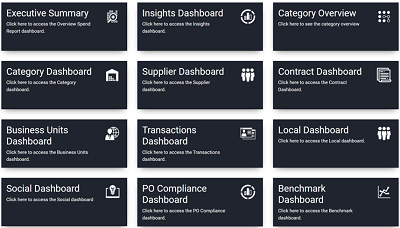Procurement Data Talks
| Next Article |
By Glen Duff, Director Strategy & Partnerships
With Queensland councils managing over $8B in spend each year, typically via a procurement process, there are many factors to consider especially regarding processes, reporting and compliance.
In the coming months, this series will share valuable insights into how our member councils (no matter how small or large they may be) can access a comprehensive suite of procurement data dashboards under Local Buy’s broader procurement and data programme (previously known as “Nex Gen”), and importantly, how insights can support council. These dashboards are at no cost to our member councils and are included as part of Local Buy’s investment into the sector.
If you work for a Queensland council and don’t have access to these dashboards, get in touch with your procurement manager or contact us directly via gduff@localbuy.net.au to discuss how your council can benefit from the Procurement Technology and Data Analytics Programme.
Local Buy, as part of Queensland’s peak body for local government (LGAQ), supports your data maturity progress. Prior to providing councils with the Procurement Platform, most councils self-identified as having little to no reporting across their procurement function, limiting their ability to make data-driven decisions and to better deliver on local priorities. Local Buy, in response to these findings, developed the Procurement Technology and Data Analytics Programme, inclusive of a full suite of procurement data dashboards for each council that sign up. The platform currently has 64 out of 77 councils signed up, with full adoption in progress.
With these procurement dashboards on the platform, councils are now empowered to move their procurement data maturity forward to a ‘self-service’ level, opening procurement and economic opportunities for each council, region, and the sector as a whole.
Importantly, these dashboards are more than just visuals. The Dashboards are created from raw (and likely not clean) data reports from council’s finance system and are securely processed by our service delivery providers’ procurement and data analysts. The result is meaningful and navigable insights across your procurement and contract metrics. With all this data analysis done for council and updated quarterly, council can better focus their limited resources on maximising the identified opportunities. Here is an overview of what some of these dashboards include:

In this series of procurement data discussions, each month we will visit a new dashboard in detail. We’ll share our thoughts about how council can use each dashboard to support both their operational and strategic priorities, ultimately supporting delivery.
The power of procurement data.
In today's rapidly evolving business landscape, councils are increasingly recognising the power of procurement data and analytics in driving strategic decision-making and achieving operational improvements. By harnessing the wealth of information generated throughout the procurement process, councils can gain valuable insights, enhance efficiency, mitigate risks, and drive significant cost savings. It pays to delve into the transformative potential of procurement data and analytics and explore how your council can leverage this power to gain a competitive edge.
Data-driven decision-making has become a cornerstone of achieving these successful council outcomes. Procurement, with its vast network of suppliers, contracts, and transactions, generates a wealth of data that holds the key to unlocking valuable insights. By utilising Local Buy’s advanced analytics tools and techniques on the Procurement Platform, Queensland councils can analyse this data to gain a comprehensive understanding of their procurement activities. This includes:
- Enhanced Visibility and Insights:
Procurement data and analytics provide councils with a wealth of valuable information. By analysing historical spend patterns, councils can gain insights into supplier metrics, identify cost-saving opportunities, and optimise procurement processes. These insights enable councils to make informed decisions, negotiate better contracts, and drive efficiency throughout the supply chain. - Cost Savings and Efficiency:
Data-driven procurement strategies empower councils to identify and eliminate inefficiencies. By analysing data on spend, supplier metrics, and market trends, councils can uncover cost-saving opportunities. This may include consolidating suppliers, renegotiating contracts, or identifying alternative sourcing options to ensure you are compliant. Leveraging analytics helps streamline procurement processes, reduce maverick spending, and improve negotiation outcomes, resulting in significant cost savings. - Risk Mitigation:
rocurement data and analytics play a crucial role in identifying and mitigating risks. By monitoring how staff are going out to market i.e. is this via a compliant method (for example, via Local Buy), supplier metrics, financial stability, and compliance metrics, councils can proactively manage supplier and audit risks. Data analysis also allows councils to identify potential disruptions and take timely actions to mitigate their impact. This helps council to maintain business continuity and safeguards against reputational damage. - Supplier Relationship Management:
Data-driven insights enable councils to cultivate stronger supplier relationships. By analysing supplier metrics, council can identify high-performing suppliers and build strategic partnerships with them. These insights facilitate collaborative supplier development initiatives, joint value creation, and innovation. By leveraging analytics, councils can establish channels, negotiate favourable terms, and foster long-term mutually beneficial relationships. - Compliance and Sustainability:
Procurement data and analytics help councils uphold compliance and sustainability standards. By monitoring supplier intelligence including pre-qualification i.e. via Local Buy suppliers, local supplier engagement or other metrics i.e. sustainability, social, environmental etc., councils can ensure they are delivering on their local priorities. This enhances brand reputation, meets stakeholder and community expectations, and supports sustainable business practices.
The power of procurement data and analytics cannot be overstated, and these dashboards can assist member councils in driving local outcomes. Councils that harness the potential of these dashboards can gain a competitive edge in today's complex operating environment. From enhanced visibility and cost savings to risk mitigation and sustainable practices, data-driven procurement strategies drive operational excellence and foster strategic supplier relationships. They can also unlock new levels of efficiency.
Next month, we’ll talk through the “Executive Summary”.
If you would like to know more, please get in contact with Glen Duff, Director Strategy & Partnerships, Local Buy via gduff@localbuy.net.au

